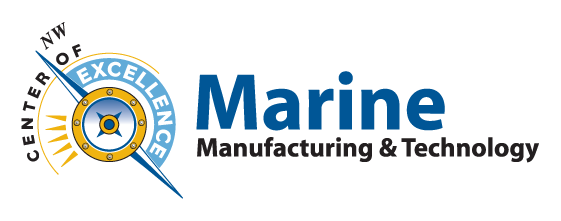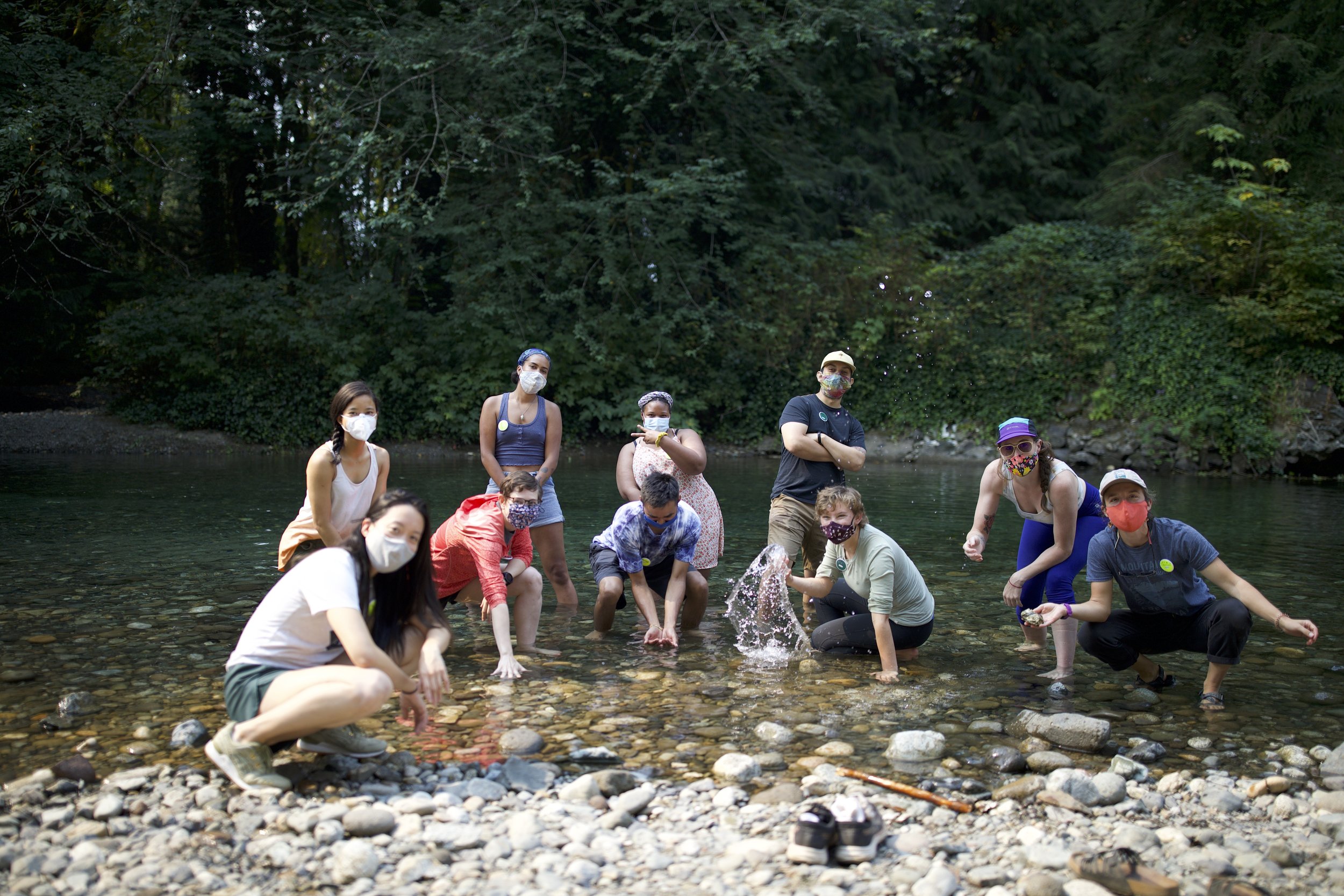Connecting Communities through Water Culture
Photo courtesy of Sea Potential, LLC.
Photo taken after a water gratitude circle led by Savannah and Ebony at
Refuge Outdoor Fest 2022
By Savannah Smith
I am someone who has always loved the water but even with my early interest in marine life and the ocean, I found it difficult to figure out how that would translate to a career someday and didn’t see how it translated outside of myself. My interests often left me feeling kind of alone because they weren’t topics of conversation between me and my peers. In fact, I often heard opposing statements or conversation shutdowns such as “Black people can’t swim”. It wasn’t until founding Sea Potential that I began learning about the rich histories around water for people form the African Diaspora. Through a talk by Kevin Dawson, author of “Undercurrents of Power: Aquatic Culture in the African Diaspora”, I learned that there was a point in time where West Africans were the strongest swimmers in the world, the first written accounts of surfing happened in Ghana in 1640, and that enslaved Africans would even buy their freedom through their ability to swim. It was actually more recent history and implications of events during the Jim Crow era like lynching near water, segregation of pools, polluted beaches in communities of color, and pressure to conform to western beauty standards that led to disconnection with water in the Black community. Learning this was instantly validating and empowering for me. However, as someone who has always loved the water it was also upsetting to me that it took so long for that information to ever reach me. It motivated me to do more to share water stories with others.
At Sea Potential, our enthusiasm for exploring, honoring, and sharing about cultural relationships to water is unwavering. Learning about the diversity of water histories is intertwined into everything we do from the development of our educational curriculum to our consulting philosophy. Today we are going to delve deeper into how uplifting diverse water cultures is important for personal relationships with water, inspiring cultural appreciation and holistic understanding, healing generational trauma, reintegrating ancestral practices, and innovation.
Fostering Personal Relationships with Water
Water is a universal element connecting us all. Everyone has a water story, but sometimes they need help realizing it. By acknowledging and learning from the various water cultures within BIPOC communities, we provide much-needed representation and empowerment. When individuals see their cultural practices, stories, and traditions recognized and appreciated or have the opportunity to learn about them for the first time, it can have a profound impact on their personal connection to water. This past summer we co-created an event called “Timelines to Tidelines: A Waterfront Storytelling Event” with Friends of Waterfront Seattle, Black Heritage Society, The Wing Luke Museum, Wa Na Wari, and Maritime Washington National Heritage Area. Multiple community members reached out to express their gratitude for a space that reframed dominant narratives and expressed their desire for more events like it in the future. It also reaffirmed my own sense of connection and deepened my relationship to the waterfront.
Shaping Recreation Choices: Cultural understanding and representation can influence recreational choices. I believe communities are more inclined to participate in water-related activities and traditions when their cultural heritage is celebrated. Hearing narratives that prove existence in a space and generations of relationship with water can inspire and motivate someone to try new experiences as they embark on their own journey of connection with water. Sharing these stories not only enriches experiences but promotes cultural preservation.
Influencing Career Choices: Exposure to diverse water cultures can inspire BIPOC individuals to explore career paths they might not have considered otherwise. Whether it's pursuing marine biology, environmental advocacy, water-related arts, pilotry, etc, representation and recognition can kindle ambitions and aspirations.
In the 7th grade I went on a sailing trip through my science club and although that experience was unique and provided me with exposure to something new, it felt like a cool one-time thing and wasn’t as formative as it could’ve been. I didn’t imagine myself being able to do something similar as a career. No one on the crew looked like me nor did I ever hear about people who looked like me having a similar career let alone positive experiences around water. This happens far too often for BIPOC and is a big reason why we make efforts to bring BIPOC career professionals with us on field trips and share stories of thriving around water across various cultures and communities in our workshop design and consulting frameworks at Sea Potential.
Fostering Stewardship: Each culture brings unique history and understanding of how to interact with, protect, and respect water. Learning from these practices can inform our environmental and community engagement in profound ways. Additionally, when people connect their personal cultural heritage to their responsibility for water and nature, I believe they are more likely to take an active role in protecting and advocating for it. The development of personal heart-based connections to water can also elicit the same call to action.
Cultural Appreciation and Holistic Understandings
Cultural appropriation is defined by Oxford Languages as “the unacknowledged or inappropriate adoption of the customs, practices, ideas, etc. of one people or society by members of another and typically more dominant people or society”. The unacknowledged and inappropriate nature means it is done in a way that is exploitative, offensive, and/or stereotypical. While cultural appreciation can be understood as the recognition, respect, and understanding of the customs, traditions, beliefs, values, art, and practices of a particular culture or cultural group. It involves acknowledging the unique and diverse aspects of different cultures as well as a genuine interest in learning about and celebrating the cultural richness of others. Cultural appreciation promotes cross-cultural understanding, fosters tolerance, and encourages individuals to engage with and embrace the traditions and contributions of various cultures, without appropriating or diminishing their significance. When we talk about learning about and sharing information about diverse water cultures, we are emphasizing doing it in a culturally appreciative way.
Mutual Respect: By sharing these practices and stories across cultures, we can create a global tapestry of knowledge and understanding. Educating people on histories and cultures outside of their own benefits everyone. In order to be in community with one another we need to normalize talking about, accepting, and uplifting differences.
Collective Wisdom: Recognizing that every culture, community, and individual contributes to a collective wisdom of unique perspectives and knowledge, we create an inclusive and nurturing environment for growth. This acknowledgment not only affirms the intrinsic value of each person's authenticity and fullness but also acts as a powerful shield against the pressures of assimilation. This in turn will foster creativity, innovation, and growth within the maritime industry.
Healing Generational Trauma
In some BIPOC communities, there is a history of trauma related to water, such as forced displacement, acts of violence on or near water, loss of ancestral lands, and water pollution or other environmental injustices. Learning about histories of resilience and connection prior to trauma and amidst prolonged trauma is a vital step in the healing process.
Releasing Stored Trauma: We know through epigenetics that different genes can be turned on and off due to environmental factors and those genes can be passed on for generations. As seen in studies on the 1994 genocide of the Tutsi ethnic group in Rwanda. At Sea Potential, incorporating somatic practices and developing embodied activities inspired by different cultural connections to water stems from this understanding. We believe moving our bodies in ways our ancestors did and sharing our stories in community can reverse the epigenetic effects of trauma and in turn pass on healing and unlock ancestral wisdom.
Cultivating Empowerment: Understanding the deep historical ties to water can help individuals and communities reconnect with their heritage and regain a sense of identity and purpose. Acknowledging the trauma while celebrating the strength and resilience of the community can empower individuals and promote collective healing. Learning how previous generations overcame challenges can also instill resilience and determination to address current issues.
Reintegrating Ancestral Practices and Inspired Innovation
Before the age of environmental degradation and industrialization, many cultures and indigenous communities maintained sustainable relationships with nature. Learning about diverse water cultures can unveil ancestral best practices for environmental sustainability and spark adaptation ideas for continuing to live in reciprocal relationship with nature amidst a changing climate.
Ancestral Best Practices: Many indigenous and traditional cultures possess knowledge of sustainable water management that western society is returning to. For example in the Pacific Northwest we’ve been seeing an increase in learning from indigenous systems of salmon management and the honoring of indigenous fishing techniques and technologies to address salmon decline. Understanding how past generations lived in harmony with the environment can inspire a return to a more balanced, reciprocal relationship with nature.
Culturally Inspired Innovation: Incorporating culture and community dynamics into present-day water management strategies can lead to more sustainable and eco-friendly approaches that support people and the environment. A great example of this is the people of Ladakh’s innovative idea to conserve water by capturing glacial runoff into ice pyramids inspired by the shape of spiritual monuments/shrines of their culture called stupas. This shows that environmental adaptation ideas can be sparked by community understanding and compliment community needs on a cultural level as well.
Conclusion
Author Savannah Smith of Sea Potential
Learning about and sharing information about diverse water cultures is not just an exercise in cultural appreciation; it's a powerful tool for unity, healing, and sustainability. In BIPOC communities, where water holds deep cultural significance, this knowledge can be a source of personal connection to water, holistic understanding and cultural appreciation, healing for generational trauma, and ancestral best practices. By celebrating the rich tapestry of water cultures, we can ensure that the flow of diversity remains a source of strength and inspiration for generations to come. Water, which already physically unites us all, is also a conduit for cultural exchange, collective understanding, environmental harmony, and industry transformation.



